• Maror, by Lavie Tidhar (Apollo UK):
In expansive moods I can talk for hours about America’s most significant contribution to modern culture. Sometimes I argue it’s jazz. Sometimes the western. But maybe it’s really the hard-boiled novel. Jazz these days is at home all over the world, and the legendary Italian movie auteur Sergio Leone long ago proved you don’t have to be within tobacco-juice-spitting distance of Monument Valley to create classic westerns.
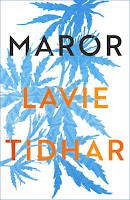 But the hard-boiled novel has remained quintessentially American, unlike its close cousin, the noir thriller. You can add “noir” to the name of any geographic region or to any national allusion in order to identify a non-American form of the genre—thus, Scandi noir, Tartan noir, etc.
But the hard-boiled novel has remained quintessentially American, unlike its close cousin, the noir thriller. You can add “noir” to the name of any geographic region or to any national allusion in order to identify a non-American form of the genre—thus, Scandi noir, Tartan noir, etc.The former kibbutz-dwelling sci-fi and fantasy novelist Lavie Tidhar’s first crime novel, Maror, could perhaps be labeled “Jewish noir.” Or even “kosher noir.” But it’s really the first great Israeli hard-boiled novel, comparable to works from today’s leading U.S. stylist in that field, James Ellroy.
Maror—the title refers to the bitter herbs placed on Passover seder tables—is a sprawling epic set against the backdrop of the building of the state of Israel. Tidhar’s story darts between 1967 and 2003, stopping off at multiple, often far-flung points in-between. Cohen, a corrupt police intelligence officer with a straight razor, a mouth full of Bible quotes, and a dubious approach to morality, keeps the peace in his own way throughout. He rises through the ranks of law enforcement, cultivates power, and turns increasingly cynical. While he is supposed to be solving crimes, Cohen also serves as our guide through Israel’s turbulent birth and evolution as a nation, its history filled not merely with idealists and visionaries, but also with gangsters and corrupt politicians and gun-runners.
Australian critic Clive James once advised, “If you can’t quell your urge to make predictions, don’t make them about the future.” So, I’ll
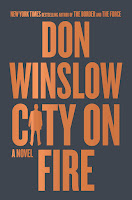 refrain from forecasting that Tidhar’s Maror may usher in a welcome wave of other hard-boiled novels around the globe.
refrain from forecasting that Tidhar’s Maror may usher in a welcome wave of other hard-boiled novels around the globe.• City on Fire, by Don Winslow (Morrow):
When young Irish dock worker Danny Ryan sees a beautiful stranger emerge from the sea at a beach resort in Rhode Island, he can tell right away that she’ll bring trouble. Danny’s not there, you understand, to gaze at long-legged lovelies. He’s on holiday with his heavily pregnant wife and their extended Irish-American family, who run half of all the illegal rackets in and around the capital city of Providence. But he knows just how tense things are between his people and the Italian-American mobsters who run the other half, and that it won’t take much to spark a feud.
The woman in the waves is visiting her new Italian gangster boyfriend. When one of Danny’s Irish relations hits on her, it sets off a chain of events that will ultimately lead to a bloody crime war.
Winslow’s use of small scenes to ratchet up tension is a sign of a master storyteller hitting his stride. In a tiny vignette, for instance, one of the Italian thugs roughs up a customer who’s late in making a debt repayment. “Jacky made him stick his right hand into the car door and then kicked it shut,” the author writes. “Then, with the guy’s hand still in the door, he drove the car around the parking lot.”
You can feel the bones crunching in that hand.
City on Fire is the first entry in a trilogy of Danny Ryan novels. As soon as I’d finished it, I raced to find out about the next volume, City of Dreams. It’s due next April. I’m already counting the days.
• Ashes in the Snow, by Oriana Ramunno (HarperCollins UK):
There’s no real puzzle as to why locked-room, Christmas-centered murder mysteries became the popular subgenre they are today. Anyone who has spent days during the holidays in unwanted close proximity to relatives they’ve spent the rest of the year skillfully avoiding, can certainly understand why contemplating the perfect murder makes for an entertaining diversion.
Italian author Ramunno’s debut work is no traditional locked-room whodunit, though. Her setting, while definitely under lock and key, is no single room. Instead, it’s a Nazi concentration camp: Auschwitz, in occupied Poland, during the 1943 Christmas season.
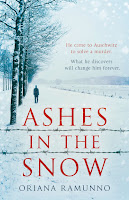 And there’s nothing at all cozy about this tale. In Chapter One, we witness an SS major stomp a Jewish baby to death in front of his mother.
And there’s nothing at all cozy about this tale. In Chapter One, we witness an SS major stomp a Jewish baby to death in front of his mother.Countless prisoners perished without investigation at Auschwitz during World War II. Yet after a young Jewish boy named Gioele Errera discovers the corpse of a slain German doctor in his office, camp authorities are quick to call in a Kriminalpolizei detective from Berlin, one Hugo Fischer. The task of figuring out the killer’s identity won’t be simple, as the deceased’s wife is hesitant to cooperate. Gioele might prove to be helpful, but in exchange Fischer will have to aid him in locating the family from which he’s become lost. Complicating matters further, the detective is under pressure to solve this case while keeping secret the fact that he suffers from a degenerative illness, one that would make him a target of the Nazi regime.
Ramunno’s story was apparently inspired by her great uncle, a concentration camp survivor, who told stories about German staff members who risked everything trying to make life at least somewhat easier for the prisoners. You’d imagine such an environment would curdle the milk of all human kindness. But apparently it didn’t.
Although it might be the bleakest of midwinters before you would think to crack open Ashes in the Snow to put you in a festive mood, it’s actually an unexpectedly uplifting pleasure.
• Even the Darkest Night, by Javier Cercas,
translated by Anne McLean (Knopf):
Towards the end of Javier Cercas’ deep and satisfying police procedural, his chief Barcelona detective, Melchor Marín, is dragged before a dying Mexican drug baron, who tells him: “Other people’s happiness is irritating.” The line is merely an aside. It’s what the drug baron says next that reveals the motive behind the brutal murders that set this story in motion. Yet it’s an aside that any reader put off by the hype surrounding this novel might find themselves agreeing with.
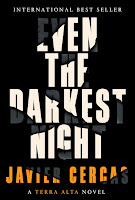 For those who don’t already know, Even the Darkest Night is the book that in 2019 received the richest literary prize ever awarded to a work of crime fiction: Spain’s Premio Planeta, which came with a check for €1,000,000 (a cool $1,037,710 today).
For those who don’t already know, Even the Darkest Night is the book that in 2019 received the richest literary prize ever awarded to a work of crime fiction: Spain’s Premio Planeta, which came with a check for €1,000,000 (a cool $1,037,710 today).I confess, I might have been a little bit jealous of, rather than “irritated” by, Cercas’ good fortune. I might even have approached this novel, hoping to be able to pick fault with it and declare it not deserving of all the hoopla. Instead, it won me over. Cercas earned every bit of “happiness” the award may have brought him. He’s a worthy prize-beneficiary, even if the size of his award is questionable in today’s straitened financial climate.
At its core this novel is a whodunit with a well-developed plot, involving the slaying of a wealthy couple in a far corner of Catalonia. It really puts its engaging and complex protagonist—Marín, the ex-con son of a prostitute—through his paces. But perhaps the biggest mystery here, is why it took three years for a yarn this good to be made available in English translation.
• Trespass, by Clare Clark (Virago UK):
Bad crime novelists draw attention to how monstrous the villains stalking their books are. The good ones know readers can work that out for themselves. Clare Clark establishes herself in this psychological suspense novel as one of the very best.
Tess is a former environmental protestor, who years ago embarked on a relationship with an older, magnetic fellow activist, Dave Taylor, only to see him turn aggressive and unpredictable before he vanished altogether. He left Tess pregnant, though, and alone to rear their child, a daughter she named Mia.
Now, as Mia approaches her 13th birthday, a relative’s passing raises uncomfortable questions about Tess’ family and her daughter’s father. It becomes clear that Dave Taylor was not who he had claimed to be, that he’d stolen his identity and was actually an undercover police officer tasked with infiltrating protest groups, spying on them and disrupting their activities. While Tess, in these pages,
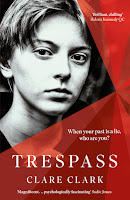 plumbs her memories and tries to untangle the mysteries surrounding the man she once loved, young Mia engages in a parallel, but sometimes clashing campaign to understand who her father really was.
plumbs her memories and tries to untangle the mysteries surrounding the man she once loved, young Mia engages in a parallel, but sometimes clashing campaign to understand who her father really was.Meanwhile, the author employs Taylor as another of her narrators, allowing him to reveal his true self in vivid and villainous three dimensions. It helps that Taylor is a real person. Well, almost. Trespass carries the regulation disclaimer about being “a work of fiction,” but Clark includes an author’s note revealing that he’s based on the shadowy eco-warrior Mark Stone. Stone was unmasked in 2011 as undercover police officer Mark Kennedy, who embedded himself in the entirely legal climate-change movement, seducing other activists to build his cover story and even impregnating one of them. A tribunal last year awarded extensive damages to a women who’d been involved with him. This year the affair figured into Scots comedian Frankie Boyle’s debut murder mystery, Meantime, as well as the BBC’s excellent crime drama Sherwood (a rare foray into television by playwright James Graham). But Clark’s latest novel, fueled by her barely suppressed rage at how women were used, abused, and betrayed by employees of a state that’s supposed to protect its citizens, is far more powerful than either of those.
Other 2022 Favorites: Notes on an Execution, by Danya Kukafka (Morrow); A Killing in November, by Simon Mason (Riverrun UK); Portrait of a Thief, by Grace D. Li (Tiny Reparations); Counterfeit, by Kirstin Chen (Morrow); and The Berlin Exchange, by Joseph Kanon (Scribner).

















1 comment:
Amen to your choice of EVEN THE DARKEST NIGHT by Javier Cercas. I thought this one would be a much bigger hit in the U.S. than it apparently is. One of the top crime novels of 2022 without a doubt.
Post a Comment